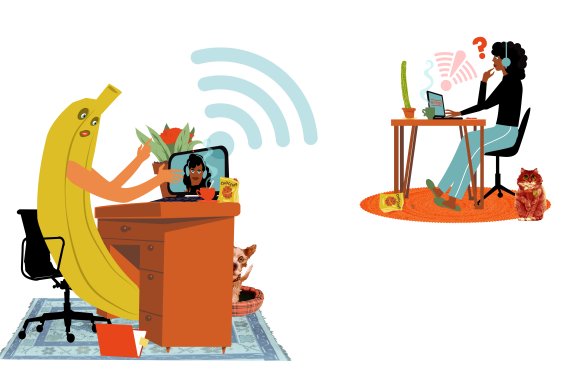Text: Roelof Kleis and Luuk Zegers
The decision was taken shortly before the start of period 5: all WUR teaching would move online for the time being. Teachers had just a few days to make the switch. A massive challenge, says Dean of Education Arnold Bregt. ‘But we were lucky with the timing as we already had a lot of people in digital teams helping teachers because of the transition from Blackboard to Brightspace. On the Friday when the decision was taken to have all teaching online only, the support teams were already on standby to help teaching staff.’
And so WUR’s army of teachers got to work. The weekend beforehand and the first two days of period 5 were all about experimenting with the options for online teaching, reflecting and swapping ideas on solutions for lessons that are difficult to do online.
Trying out something new is actually quite fun
The first thing assistant professor of Rural Sociology Jessica Duncan did was to develop a strategy for how best to share information with her students. ‘Some students were quite worried, not just about the virus but also about their education. So I gave them as much information as possible and we started a WhatsApp group so that we can communicate easily.’

In the first live web lecture, Duncan challenged her students to ask questions. If they asked enough interesting questions in the first half of the lecture, Duncan would give the second half of the lecture dressed as a banana. ‘Not because I particularly enjoy dressing as a banana but to encourage the students to use the chat function.’ It worked: the students got fully involved and Duncan taught the second half in a banana suit.
Fieldwork online?
Jente Ottenburghs (who lectures on Ecology) is using guest lectures recorded last year in the Climate Change Ecology module. ‘Students also have to read a book and do exercises on that. We supervise them via email. They would normally have to work in groups, studying a chapter from that book and giving a presentation to the other group members. But of course we can’t do that now.’

Ingrid Lubbers (Soil Geography and Landscape lecturer) teaches Landscape Geography. She doesn’t have any ready-made lectures available from last year. ‘We didn’t record the lectures last year precisely because we wanted the students to come to the lectures in person.’ That module also includes a lot of days of fieldwork. How do you deal with that? ‘The idea is for teachers to go into the field themselves and film videos of the work using a mobile phone,’ explains Lubbers. ‘And then make it available using Brightspace. That digital learning environment has been a godsend. Of course it can’t replace normal teaching but being able to try out something new is actually quite fun. We try to make the best of things.’
‘It should just work’
Not everything is a success straight away, says Jan Dijkstra (associate professor of Animal Nutrition). ‘I did my first live web lecture on the first Tuesday of the period. I wanted to explain to the students how we would be doing this module now that it would be entirely online. But I heard afterwards that many of the students couldn’t get access because the system wasn’t working. Fortunately it was recorded and they could replay it later — although that too was difficult even at a quiet time like a Tuesday evening.’
We are very dependent on the technology
On the Wednesday morning of week 1, it was announced that watching live was being disabled for now as it overloads the system. ‘That creates room for students to replay recorded lectures,’ says Dijkstra. He understands teething problems are inevitable. ‘But that doesn’t make it any easier for us teachers. We are very dependent on the technology. When students were unable to access my web lecture, I was inundated with emails. It should just work.’
Even so, the vast majority of the 299 courses in period 5 started ‘normally’. ‘There are a few practicals where you really need to be in the lab yourself,’ says Bregt. ‘You can’t do them from home so those courses have been cancelled. But our lecturers and the online support team have been working incredibly hard. Of course not everything is a success. Some things have worked but there is an awful lot still to do. But the mood is positive on the whole. We are all doing our bit and trying to get as far as we can.’
| Only online in period 6 too |
|---|
| All WUR teaching will be online only at least until the end of period 6. That means the exams will be held online, so teachers need to think about how to arrange that. Depending on how the pandemic develops in the Netherlands, the measures may be adjusted to allow fieldwork and practicals in the second half of period 6. An exception may also be made for lab and experimental work in graduation subjects (if the chair-holder gives permission). |

 Illustration: Yvonne Kroese
Illustration: Yvonne Kroese